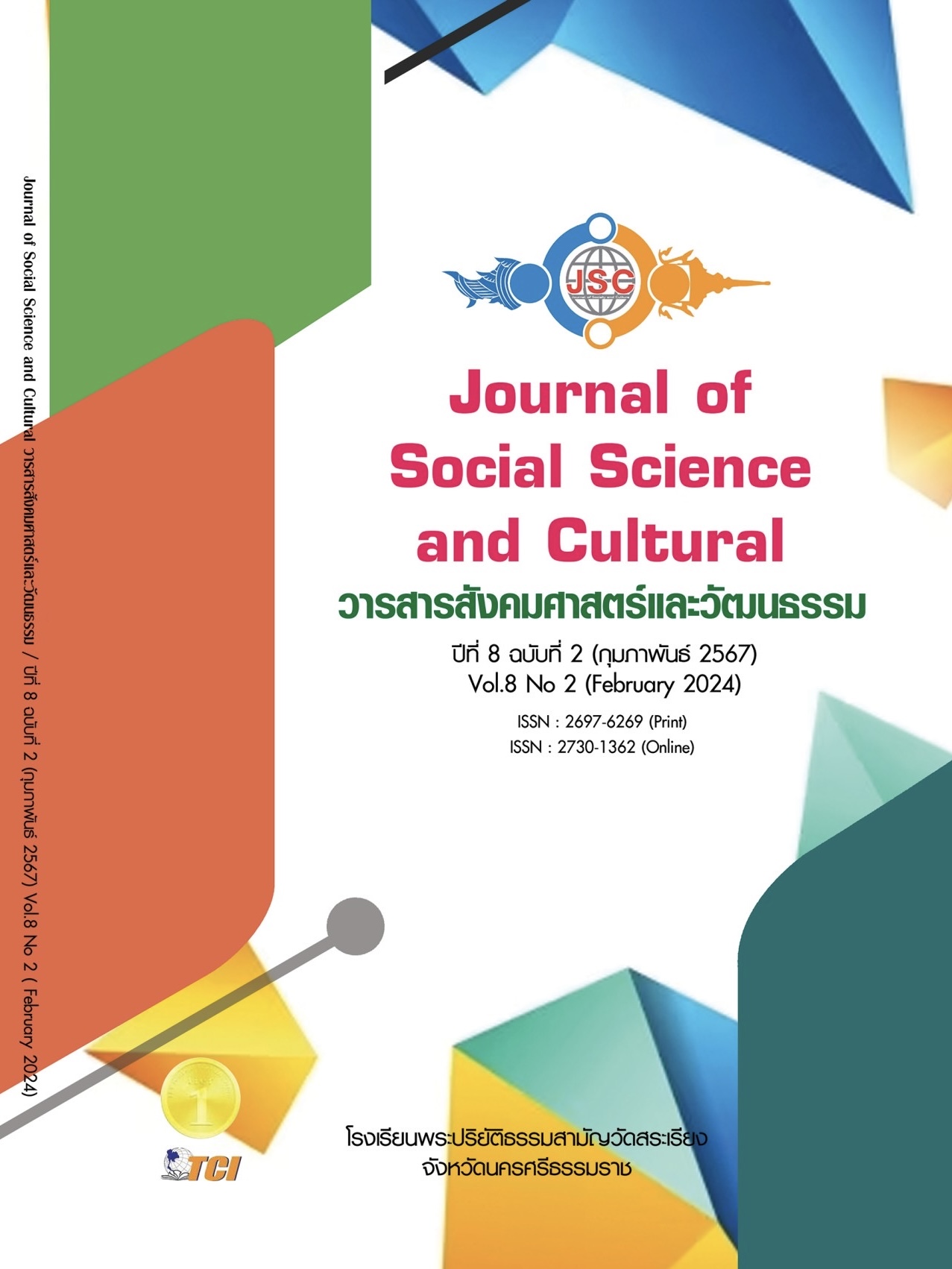THE STUDY OF BEHAVIORAL INDICATORS OF INNOVATIVE PROBLEM-SOLVING ABILITIES AMONG RAJABHAT UNIVERSITY’S STUDENT TEACHERS
Main Article Content
Abstract
The objective of this research is to examine behavioral indicators of innovative problem-solving abilities among Rajabhat University’s student teachers. In this study, a mixed research technique was used, determine a group of experts for interviews using a purposive selection strategy. Seven professionals are qualified based on their properties. Have knowledge, skills, and experience structuring learning in higher education institutions through problem-solving and innovation processes. or has knowledge and abilities. Have prior experience with problem solving and innovation, or have completed academic studies in these areas. Semi-structured interviews, conducted by the researcher himself, are used as research instruments. Due to the COVID-19 epidemic, we conducted online interviews through Zoom meetings. The study's findings revealed that Rajabhat University's student teachers' innovative problem-solving abilities consisted of four components: 1) The ability to recognize challenges encountered by learners during learning. Indication behavior involves identifying the problem and determining its root cause. and select and prioritize problems that must be solved. 2) The ability to generate ideas and come up with innovative problem-solving solutions Searching for and collecting information is an example of indicative behavior. Analyze the data found. Gather solutions to difficulties. and apply innovative problem-solving strategies. 3) Ability to generate new ideas for problem solutions Indicative behavior is innovative design, testing, evaluating, and improving innovation. And 4) The ability to share innovation has behavioral indicators, such as experimentation with innovation to solve challenges. and transfer innovation. Examine the outline of behavioral indicators provided by experts. Consistency was 0.93, and checking the appropriateness of the indicated behavior in all 4 areas had an average appropriateness of 4.92.
Article Details
References
เกรียงศักดิ์ เจริญวงศ์ศักดิ์. (3 มิถุนายน 2564). การแก้ปัญหาเชิงนวัตกรรม. (สุชาวดี สมสำราญ, ผู้สัมภาษณ์)
นลินทิพย์ คชพงษ์. (2561). การพัฒนารูปแบบการจัดการเรียนรู้เชิงจิตวิทยาเพื่อเสริมสร้างการแก้ปัญหาอย่างสร้างสรรค์สำหรับนักศึกษาวิชาชีพครู. ใน ดุษฎีนิพนธ์ปรัชญาดุษฎีบัณฑิต สาขาการวิจัยและพัฒนาหลักสูตร. มหาวิทยาลัยศรีนครินทรวิโรฒ.
มิ่งขวัญ ภาคสัญไชย. (2560). การประเมินผลการแก้ปัญหาเชิงสร้างสรรค์ของนักศึกษาระดับปริญญาตรี มหาวิทยาลัยเทคโนโลยีพระจอมเกล้าธนบุรี. Veridian E-Journal, Silpakorn University (Humanities, Social Sciences and arts), 10(2), 2654-2661.
วลัยลักษณ์ รัตนวงศ์. (2562). นวัตกรพลิกโลก . Hatyai Academic Journal, 17(1), 103-108.
วิลาวัณย์ จารุอริยานนท์. (2566). รูปแบบการเสริมสร้างคุณลักษณะครูที่พึงประสงค์ในศตวรรษที่ 21 สำหรับนักศึกษาครูมหาวิทยาลัยราชภัฏ. Journal of Education Studies, 50(1), 1-10.
Ariya, K., et al. (2016). A development of an instructional model based-ondifferentiatedinstruction approach to enhance the ability of learning management design of 21st century for student teachers, Rajabhat University. Lampang Rajabhat University Journal, 5(2), 1-17.
Dyer, J. H., et al. (2009). The innovator’s DNA. Harvard business review, 87(12), 60-67.
D'zurilla, T. J. & Goldfried, M. R. (1971). Problem solving and behavior modification. Journal of abnormal psychology, 78(1), 107.
Goldsmith, B. (2001). Innovative problem solving. AFP Exchange, 21(4), 78-79.
Goldsmith, R. E. (1986). Personality and adaptive-innovative problem solving. Journal of Social Behavior and Personality, 1(1), 95-106.
Harrington, J. & Voehl, F. (2011). Innovative Problem Solving: The Next Big Thing. International Journal of Innovation Science, 2(3), 113-121.
Stefanović, N., et al. (2013). Innovative problem-solving methods in education field. Education Journal, 2(2), 27-35.


